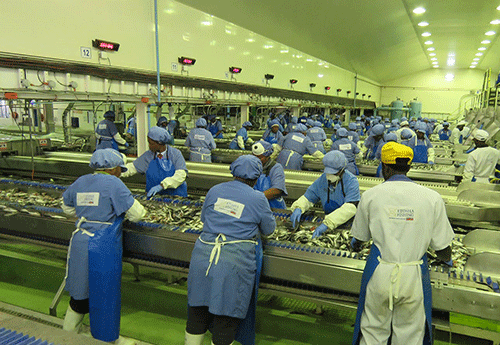WALVIS BAY – Employees at Etosha Fishing can breathe a sigh of relief after the company made a U-turn on its plan to lay off some workers.
This is after the government came to their rescue through an allocation of 5 000 metric tonnes (MT) of a governmental objective horse mackerel quota to sustain the cannery operations and preserve employment.
Until now, the future of at least 430 employees of Etosha Fishing, one of the oldest fishing companies in Namibia, was bleak, as they were expected to be without jobs, starting next month.
In a statement, the company announced there will be no retrenchments.
Employees, however, will not be expected back at work immediately, as they will have to work on a turnaround strategy to make the company more profitable, the company said.
The last couple of years have arguably been the most difficult in the history of their existence, with consecutive losses recorded annually.
As a result, Etosha requested 10 000 MT of horse mackerel from the government to keep the company afloat.
“We received an allocation of 5 000 MT governmental objective quota through the fisheries ministry to sustain the cannery and preserve employment at the company. Operations at the cannery will not commence with immediate effect, as the company is in the process of sourcing catch capacity to land the quota. All workers will be kept abreast of developments at the company,” Etosha’s acting managing director Volker Paulsmeier said.
He also indicated that the quota given by the government is only a short-term relief measure and will not be able to sustain operations in the long term.
“The initial request was 10 000 MT. However, the company will initiate a turnaround strategy, aimed at securing the long-term sustainability of Namibia’s sole operational cannery. We are extremely grateful to the government for this lifeline. It prevents the cannery from shutting its doors for good. The relief quota buys us a little more time to refine and put in place our turnaround strategy to ensure extended employment terms for our workers as part of our long-term sustainability strategy,” said Paulsmeier.
The mainstay of Etosha’s business over the years has been the canning of pilchards for leading brands, such as Lucky Star and Glenryck South Africa.
Etosha has been battling to stay afloat since 2015 due to a decline in pilchards that ultimately resulted in a ban on their harvesting of pilchards in 2018.
Paulsmeier indicated they have been importing pilchards from Morocco to keep heads above the stormy waters.
“Since the introduction of the pilchard moratorium in 2017, which remains in place, Etosha Fishing has pursued all possible avenues to sustain employment and operations, including the importation of frozen pilchards for local canning. Due to a volatile exchange rate and the high cost of importing raw materials, this is no longer a viable solution to sustain operations; hence, the company initiated termination of employment procedures earlier this year,” Paulsmeier explained.



